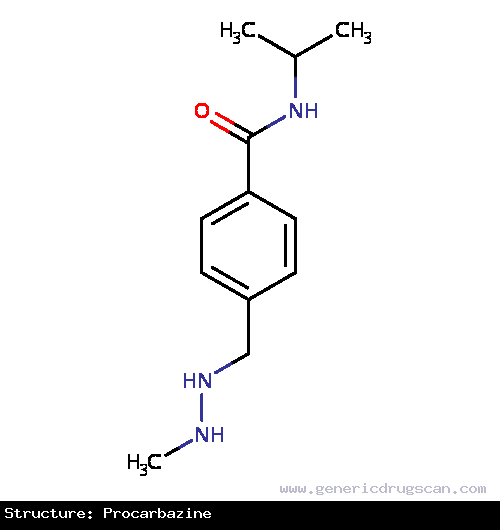Procarbazine Drug: Indication, Dosage, Precaution, Side Effect , Storage, Category Type and corresponding Brands - www.genericdrugscan.com
Procarbazine
Drug Status in USA : ApprovedDrug Status in Canada : Approved
pronunciation
pronounced as (proe kar' ba zeen)
Why is this medication prescribed?
Procarbazine is used in combination with other medications to treat certain types of Hodgkins disease (types of cancer that begin in a type of white blood cells that normally fights infection). Procarbazine is in a class of medications called alkylating agents. It works by slowing or stopping the growth of cancer cells in your body.
How should this medicine be used?
Procarbazine comes as a capsule to take by mouth. It is usually taken one or more times a day. The length of treatment depends on the types of drugs you are taking, how well your body responds to them, and the type of cancer you have. Take procarbazine at around the same time(s) every day. Follow the directions on your prescription label carefully, and ask your doctor or pharmacist to explain any part you do not understand. Take procarbazine exactly as directed. Do not take more or less of it or take it more often than prescribed by your doctor. Your doctor may adjust your dose of procarbazine or stop your treatment for a period of time depending on your response to treatment and any side effects that you experience. Talk to your doctor about how you are feeling during your treatment.
What are the precautions to be followed?
Before taking procarbazine,- tell your doctor and pharmacist if you are allergic to procarbazine, any other medications, or any of the ingredients in procarbazine capsules. Ask your pharmacist for a list of the ingredients.
- tell your doctor if you are taking or you plan to take any of the following prescription or non-prescription medications: certain antidepressants including amitriptyline (Elavil) and imipramine (Tofranil); medications for asthma; medications for allergies, hay fever; medications containing alcohol (cough and cold products, such as Nyquil, and other liquid products); and nasal decongestants, including nose drops and sprays. Your doctor may tell you not to take these medications with procarbazine and may suggest other treatment(s).
- tell your doctor and pharmacist what other prescription and nonprescription medications, vitamins, nutritional supplements, and herbal products you are taking or plan to take. Be sure to mention any of the following: barbiturate medications such as phenobarbital; medications for high blood pressure; medications for nausea or mental illness; opioid (narcotic) medications for pain; sedatives; sleeping pills; and tranquilizers. Your doctor may need to change the doses of your medications or monitor you carefully for side effects. Many other medications may also interact with procarbazine, so be sure to tell your doctor about all the medications you are taking, even those that do not appear on this list.
- tell your doctor if you have received radiation therapy or other chemotherapy within the last 4 weeks.
- tell your doctor if you have or have ever had kidney or liver disease.
- tell your doctor if you are pregnant, plan to become pregnant, or are breast-feeding. You should not become pregnant or breast-feed while you are taking procarbazine. If you become pregnant while receiving procarbazine, call your doctor. Procarbazine may harm the fetus.
- know that you should not drink alcoholic beverages (including beer and wine) while taking this drug. Alcohol may cause an upset stomach, vomiting, stomach cramps, headaches, sweating, and flushing (redness of the face).
- tell your doctor if you use tobacco products. Smoking may increase the risk that you will develop other cancers. You should stop smoking.
What are possible side effects of this medication ?
Procarbazine may cause side effects. Tell your doctor if any of these symptoms are severe or do not go away:- nausea
- vomiting
- loss of appetite
- constipation
- stomach pain
- dryness of mouth
- changes in skin color
- hair loss
- difficulty falling asleep or staying asleep
- headache
- bone, joint, or muscle pain
- increased urination
- sores in the mouth and throat
- severe or ongoing diarrhea
- pain, burning, numbness, pricking, or tingling in the hands or feet or on the skin
- uncontrollable shaking of a part of your body
- confusion
- hallucinating (seeing things or hearing voices that do not exist)
- seizures
- vision changes
- fainting
- dizziness
- fast or irregular heartbeat
- fever, sore throat, chills, or other signs of infection
- unusual bruising or bleeding
- black, tarry stools
- red urine
- hives
- rash
- itching
- difficulty breathing or swallowing
- yellowing of the skin or eyes
Procarbazine may increase the risk that you will develop other cancers. Talk to your doctor about this risk.
Procarbazine may cause other side effects. Call your doctor if you have any unusual problems while taking this medication.
How to store the medication and dispose it of after its use later?
Keep this medication in the container it came in, tightly closed, and out of reach of children. Store it at room temperature and away from light, excess heat and moisture (not in the bathroom). Throw away any medication that is outdated or no longer needed. Talk to your pharmacist about the proper disposal of your medication.
Drug Category/Class
- Antineoplastic Agents
- Immunosuppressive Agents
- Antineoplastic and Immunomodulating Agents
- Methylhydrazines
- Methylhydrazines
| Prescribed | For use with other anticancer drugs for the treatment of stage III and stage IV Hodgkin's disease. |
| Weight : | 221.2988 |
| Structure | Procarbazine |
 | |
| Formula | C12H19N3O |
Procarbazine has 6 Brands listed
| Hodpro (50 mg) | Indicab (50 mg) |
| Indicarb (20 mg) | Neozine (50 mg) |
| P Carzine (50 mg) | Zinocarb (50 mg) |
Search Generic Drugs alphabetically
